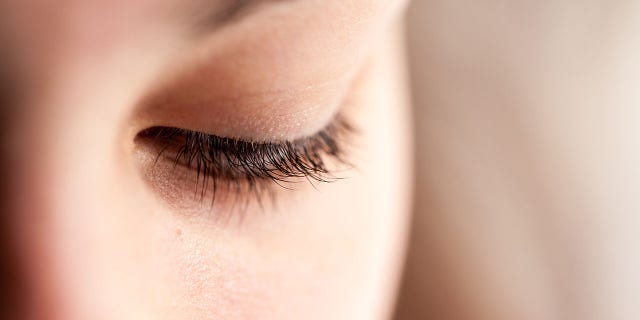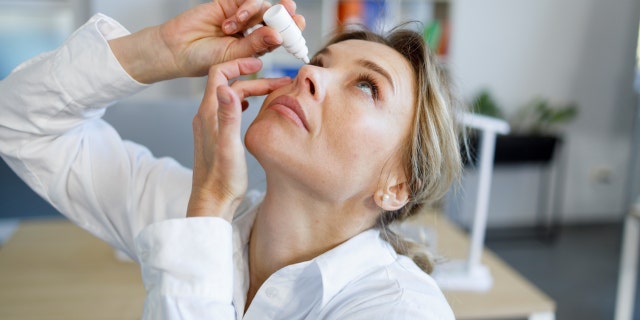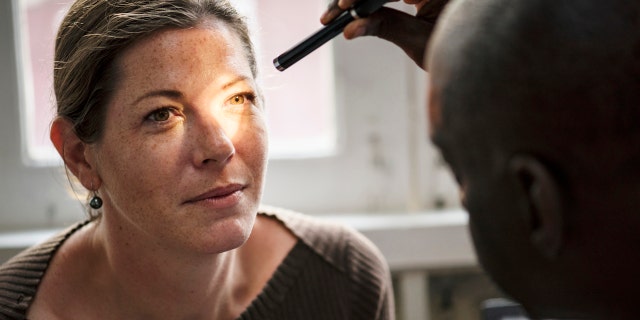Castor oil has gone viral as a wellness trend on TikTok for vision problems, but medical experts warn the practice may do more harm than good when it comes to eye health.
“While castor oil is beneficial for moisturizing the skin, there is no current evidence that castor oil is safe to be used in the eyes,” Nishika Reddy, M.D., assistant professor of ophthalmology at Moran Eye Center’s Midvalley Health Center at University of Utah in Murray, Utah, told Fox News Digital.
Castor oil has been used for thousands of years, dating back to Ancient Egypt; it was first used to fuel lamps, according to previous studies. Cleopatra even reportedly used the natural remedy to straighten her hair and to brighten the white in her eyes.
EYE SPY A BIG PROBLEM: CALIFORNIA DOCTOR REMOVES 23 CONTACT LENSES FROM WOMAN’S EYE
But the U.S. Food and Drug Administration (FDA) still classifies castor oil as safe only as a laxative for constipation.
That hasn’t stopped those on TikTok from promoting its properties to improve eye dryness, floaters, eye infections and serious eye conditions, such as cataracts and glaucoma, under the #castoroilforeyesight, totaling at least 3.7 million views.

Castor oil has gone viral on TikTok, with users promoting it as a fix for eye dryness, floaters, eye infections and even serious eye conditions such as cataracts and glaucoma. Doctors stress that such use has “not been sufficiently studied and is not a current treatment for dry eye disease” or other conditions. (iStock)
One user boasted that she reads more without her glasses after rubbing the oil on her eyelids for two weeks.
Another woman also praised it as a natural remedy for helping to decrease her eye floaters, which are small dark shapes that “float” in the visual field, according to Mayo Clinic.
“If castor oil got into a person’s eye, they may notice temporary improved vision due to the moisturizing effect,” Dr. Reddy noted.
But “instead of using castor oil, which has not been sufficiently studied and is not a current treatment for dry eye disease, you can try artificial tears that are enhanced with flaxseed oil to provide moisture.”
What is castor oil?
Castor oil is a vegetable oil, rich in fatty acids. It’s made from pressing castor seeds, according to multiple reports.
Once the oil is ingested, the digestive tract breaks it down into ricinoleic acid in the small intestine, which helps stimulate the bowels for occasional constipation, per medical reports.
Placing castor oil on the eyelids will not treat serious eye conditions, such as glaucoma and cataracts, because those are problems inside in the eye.
Health experts, however, caution against using it for chronic constipation because it can cause cramping and diarrhea; they warn that overuse may lead to life-threatening electrolyte imbalances.
The ricinoleic acid prevents water loss from the skin, so manufacturers often capitalize on its moisturizing properties by adding it in lotions, makeup and cleansers, according to Healthline.
Although experts say castor oil can be used safely as a skin moisturizer, people should also be alert for allergic side effects, include skin rashes, itching, swelling and skin irritation.
Most studies, however, that highlight castor oil’s promising properties are based on personal observations, not rigorous research trials.

Certain types of glaucoma may show up via sudden eye pain, while cataracts can cause blurry vision. If you experience any eye pain or vision changes, you should seek prompt medical attention. (iStock)
More comprehensive research is needed to know if the wide-ranging benefits that people find successful in their own experience are safe and beneficial for the public, according to medical reports.
Glaucoma, cataracts not affected by castor oil
Placing castor oil on the eyelids will not treat serious eye conditions, such as glaucoma and cataracts, because those are problems inside in the eye, according to experts.
Glaucoma occurs when there is too much fluid in the front part of the eye, which damages the nerve that allows us to see — the optic nerve — according to the American Academy of Ophthalmology.
The eye is continually making a fluid known as aqueous humor.
Placing castor oil on the eyelids will not treat serious eye conditions, such as glaucoma and cataracts, because those are problems inside in the eye.
Normally the pressure in the eye is stable, because an equal amount of fluid that the eye produces also drains out through an area called the drainage angle, the academy added on its website.
BE WELL: GET REGULAR EYE EXAMS TO PROTECT VISION AND CATCH WARNING SIGNS EARLY
When the drainage angle is not functioning correctly, fluid in the eye increases, eventually damaging the optic nerve.
Cataracts is an age-related condition that often starts after 40 when the natural lens of the eye starts to become cloudy.
When proteins start to degrade the lens, our vision can appear blurry, akin to looking through a foggy windshield, according to American Academy of Ophthalmology.

“Even if you think you have 20/20 vision, set up a time to get your eyes checked,” said one medical professional. (iStock)
Certain types of glaucoma may show up via sudden eye pain, while cataracts can cause blurry vision.
Any eye pain or vision changes should receive prompt medical attention.
How can we keep our eyes healthy?
It’s a good idea to get a baseline eye exam by age 40, even if you feel your eyesight is normal.
“Your brain adapts to vision loss, making some eye diseases go unnoticed until it is too late,” the academy noted in a press release.
When sitting at the computer for long periods of time, follow the 20-20-20 rule. Every 20 minutes, look at something 20 feet away for 20 seconds.
The eye association also encourages people to wear sunglasses, use eye protection when playing sports (such as racquetball or paintball), wear safety goggles when doing home repair jobs and be aware of eye fatigue.
CLICK HERE TO SIGN UP FOR OUR HEALTH NEWSLETTER
When sitting at the computer for long periods of time, follow the 20-20-20 rule: Every 20 minutes, look at something 20 feet away for 20 seconds.
The academy also encourages people to eat dark green, leafy vegetables such as kale and spinach, as well as orange vegetables, as these contain vitamins that help the nerve tissue inside the eye stay healthy.
CLICK HERE TO GET THE FOX NEWS APP
“Even if you think you have 20/20 vision, set up a time to get your eyes checked,” Dianna Seldomridge, M.D., clinical spokesperson for the American Academy of Ophthalmology, which is based in San Francisco, California, told Fox News Digital.
“It may save your sight.”